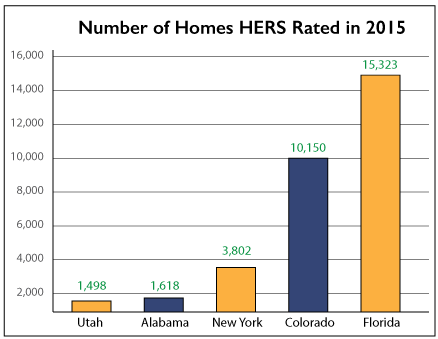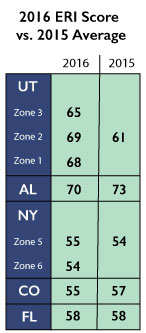No products in the cart.
Energy Rating Index Compliance Path Gains Momentum
It was decided at the 2018 IECC code hearings in Louisville, KY that the Energy Rating Index option will be maintained for the 2018 International Energy Conservation Code.
The Energy Rating Index (ERI) is a new compliance path that was introduced with the 2015 version of the IECC code. This option relies on the Home Energy Rating System (HERS), which assesses projected energy use in homes and offers a score on a scale of 1-100 that conveys energy efficiency. With the ERI option, states and municipalities can write into their energy codes a mandatory score that builders must meet to comply. To learn more about the ERI path or how to comply with the 2015 IECC code requirements, please visit our previous post – 2015 IECC Code: A Look at Builders’ Options.
Another action at the Louisville 2018 IECC code hearing was that the Leading Builders of America proposed to increase the Energy Rating Index scores from (51 to 55) to (57 to 62). This was approved and will make the Energy Rating Index option more attractive to builders.
These actions will be reconsidered at the 2018 IECC final hearings in Kansas City in October.
Within the last month, however, 4 states and 1 municipality have adopted the Energy Rating Index compliance path for their energy codes. Those regions are:
- Alabama
- Denver, CO
- Florida
- New York
- Utah
Alabama
– required Energy Rating Index score must be 70 or lower. In Alabama in 2015, there were 1,618 homes rated according to the RESNET standards and issued a HERS Index Score. The average HERS score of homes rated in the state was 73. The new residential code went into effect on October 1, 2016.
Denver, CO
– required Energy Rating Index score must be 55 or lower. In Colorado in 2015, there were 10,150 homes rated according to the RESNET standards and issued a HERS Index Score. The average HERS score of homes rated in the state was 57.
Florida
– required Energy Rating Index score must be 58 or lower. In Florida in 2015, there were 15,323 homes HERS rated and issued a HERS Index Score. The average HERS score of homes rated in the state was 58.
The Florida legislature also tasked the Florida Building Commission to determine by October 1, 2016 whether onsite renewable power generation may be used for compliance to the Energy Rating Index option.
New York
– the Energy Rating Index scores are:
- IECC Climate Zone 5 – not to exceed a score of 55
- IECC Climate Zone 6 – not to exceed a score of 54
The modified NY energy code goes into effect on October 3, 2016.
In New York in 2015, there were 3,802 homes HERS rated and issued a HERS Index Score. The average HERS score of homes rated in the state was 54.
Utah
– The Utah legislature adopted a modified 2015 IECC. In terms of the Energy Rating Index, the new state energy code modified the Energy Rating Index scores requirements to:
- IECC Climate Zone 3 – not to exceed a score of 65
- IECC Climate Zone 2 – not to exceed a score of 69
- IECC Climate Zone 1 – not to exceed a score of 68
In Utah in 2015, there were 1,498 homes rated according to the RESNET standards and issued a HERS Index Score. The average HERS score of homes rated in the state was 61.
The 2016 Utah energy code is a first in that it defines who can conduct air and duct tightness testing required by the Utah energy code: “The following parties shall be approved to conduct testing: Parties certified by BPI or RESNET, or licensed contractors who have completed training provided by Blower Door Test equipment manufacturers or other comparable training.”
In addition, the Utah legislature set the state energy code on a six year cycle.


There are now 10 states that have adopted the Energy Rating Index option as a compliance path to their state energy codes. The states that have incorporated the ERI into their energy code are:
- Alabama
- Florida
- Illinois
- Maryland
- Michigan
- New Jersey
- New York
- Texas
- Utah
- Vermont
To learn more about how you can meet your state energy code with the ERI option, consider becoming a certified RESNET HERS Rater. These individuals are building science professionals who commonly work with builders and realtors.
We’re already seeing explosive growth in some of the states that have adopted this option, namely Michigan. Don’t wait until the last minute to arm yourself with the knowledge, skills, and certifications to take advantage of the energy code changes! We’re here to help – getting you trained up and ready to go!